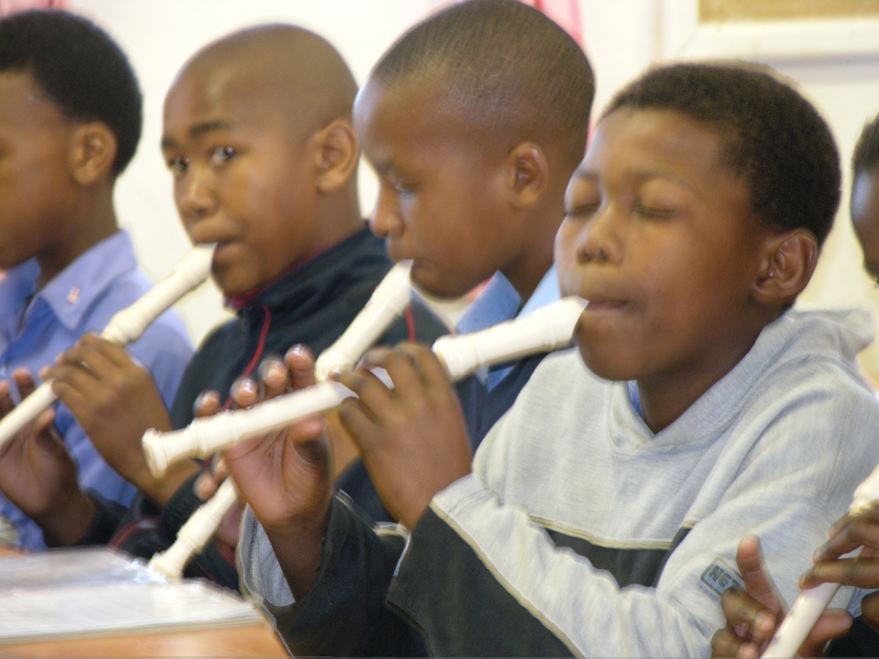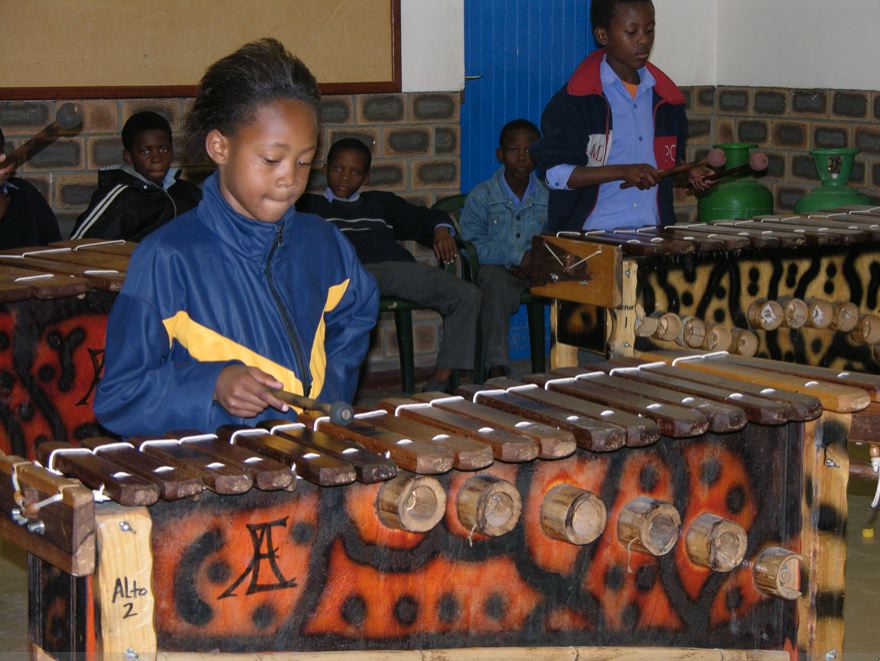
Global Perspectives on Human Language:
The South African Context
Rocio Nohemi Cardenas
Updated 9-19-2004

Learners study musical theory and play the recorder in the Amy Biehl Foundation's Music Program
Background
The Amy Biehl Foundation is a non-governmental organization that has used the legacy of Amy Biehl to bring exposure and opportunities to underprivileged communities. The organization was founded in honor of Amy Biehl, a young white American woman killed in 1993 by PAC members coming from a rally.
A Uniquely South African NGO
The presence of NGOs in South Africa is strong and varied. There are hundreds of NGOs that each address specific needs and deal with specific limitations. Most of them encounter problems with funding and establishing effective and sustainable programs.
While this is also true for The Amy Biehl Foundation, this organization is drastically different from other NGOs in South Africa. The difference lies in the reasons behind the support both domestically and especially internationally that the Foundation receives.
Amy Biehl was one of many who lost her life because of apartheid. A group of people frustrated and desperate because of the oppression and brutality of the apartheid government killed her. However, her story is well known internationally not because it was a rare occurrence for people to die, but because she was a white, American woman killed by the people she was trying to help. Her story and appeal increased even more after her parents attended the trial before the Truth and Reconciliation Commission and said that they wanted the TRC to grant the four men responsible for Amy Biehl's death amnesty.
Undoubtedly Amy Biehl and her parents have proven to be exceptional people invested in changing the lives of those oppressed during and as a result of apartheid. The work of The Amy Biehl Foundation and the improvements it has made in the lives of black South Africans living in townships is also admirable. The music programs at primary schools not only provide an artistic outlet for children, they also build important self-esteem, and serve as a showcase of the talent of these children.

The Amy Biehl Foundation in the South African Context
Given the explanation for the support the Foundation receives and considering the drastic inequality that exists in South Africa, the work of Steve Biko becomes especially relevant in evaluating the role of The Amy Biehl Foundation in the South African context.
Steve Biko saw the white liberal as someone who viewed the oppression of blacks as 'a problem that has to be solved' whilst 'the blacks are experiencing a situation from which they are unable to escape at any given moment. Theirs is a struggle to get out of the situation and not merely to solve a peripheral problem ...'. Biko felt that 'no matter what a white man does, the colour of his skin - his passport to privilege - will always put him miles ahead of the black man'. Biko was adamant that there was no 'black problem' in South Africa. 'There is nothing the matter with blacks. The problem is WHITE RACISM and it rests squarely on the laps of white society ... White liberals must leave blacks to take care of their own business while they concern themselves with the real evil in our society - white racism'.
Burke, B. (2004) 'Steve Biko and Informal Education' The Encyclopedia of Informal Education" www.infed.org/thinkers/biko.htm
It is difficult to apply Steve Biko's work to The Amy Biehl Foundation without appearing to be devaluing the work of the Foundation and the generosity of those involved in carrying out this work. Again, the Foundation is doing amazing things that are desperately needed in the townships. There is an immediate and ever-increasing need for better schools and more availability to extra-curricular activities that allow people to express themselves. The problem arises when one considers the reasons for the inequity and ever-increasing needs of townships. Yes, the apartheid years are to blame but the continued racism is also to blame. There is a reason why Amy Biehl as a person attracts so much more attention and support than would a black counterpart. It is more comfortable for people, especially people belonging to groups who have not been previously disadvantaged to rally behind an Amy Biehl. She was a woman who was not an "oppressor", actively trying to eliminate apartheid. Yet as Steve Biko says despite her U.S. citizenship, the color of her skin put her "miles ahead." She too could not escape her privilege much like many of the directors of the Amy Biehl Foundation and most importantly, the monetary supporters of the Foundation.
So what does this mean? Does it mean that the Foundation should stop carrying out its work because it was established in honor of a white woman? No, definitely not. Does it mean that Amy Biehl, her parents, her white supporters are terrible people? No. Their work is needed but so is the recognition that the reasons for the unique support of the foundation are an indication that the "real evil in society", white racism, has not come to an end. Instead it is still present and perpetuating "the peripheral problem."